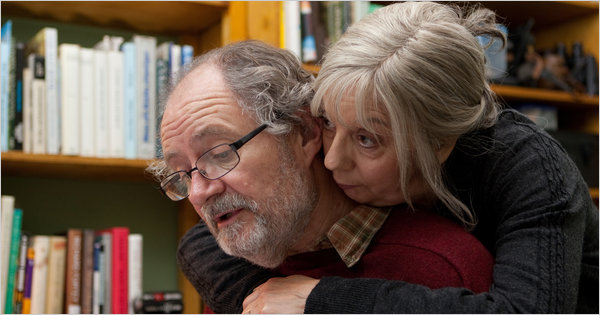Movie review by Greg Carlson
Mike Leigh’s polarizing style moves and inspires some as surely as it alienates and bores others, and “Another Year,” the prosaically titled Academy Award nominee in the original screenplay category, falls short of several of the filmmaker’s features, including “Happy-Go-Lucky,” “Vera Drake,” “Secrets & Lies,” and cult favorite “Naked.” Divided into seasonal quadrants leading up to an inevitable winter, “Another Year” bluntly compares the comfortable existence of an aging couple with the misery and loneliness of a frequent dinner guest. Deliberately selected quotidian content shapes the narrative in a decidedly low-key portrait of domesticity, and audience enjoyment will depend on tolerance levels for the prickly and often unlikable characters populating the film.
As Tom and Gerri, Jim Broadbent and Ruth Sheen reek of blissful, long-term partnership. Employed, stable, and affectionate, they often entertain their sad sack pals at cookouts featuring the bounty of their well-tended and symbolic garden allotment. Chief among the losers is Mary (Lesley Manville), a souse whose dreams of romantic partnership are so desperate she openly flirts with Tom and Gerri’s thirty-year-old son Joe (Oliver Maltman). While Mary’s encyclopedia of woe charts one futile letdown after another, a visit from Tom’s old buddy Ken (Peter Wight), a wheezing, chain-smoking lush, makes her plight look – for a moment – sunnier by comparison.
No reviewer hated Leigh’s film more than the Village Voice’s Karina Longworth, whose blood-draining demolition compared “Another Year” unfavorably with “The Human Centipede.” Longworth might have a point with her criticism of the entitlement, self-righteousness and condescension demonstrated by Tom and Gerri to their less fortunate acquaintances, but she misses the man’s point when bemoaning the ambiguity inherent in the writer-director’s own sympathies. One of the film’s pleasures is the concluding scene’s alliance with Mary in her emotional isolation, which unfolds as a grim epiphany (or perhaps anti-epiphany) that would be right at home in “Dubliners.”
After spending the entirety of the narrative as an object of pity, scorn, and even ridicule, Mary sits in the midst of a group meal as the soundtrack fades to silence. Far from Longworth’s description as “totally awful,” Mary has perhaps glimpsed a kind of future to which she may resign herself. Branched into a pair of possibilities in which a tenuous connection to Tom’s quiet brother Ronnie (the excellent David Bradley) opposes the resignation of continued solitude, Leigh renders enough vagueness for the viewer to wonder whether Mary will continue to search for some elusive joy that sits just out of reach.
Additionally, Leigh shares a clue to his concerns with the cameo appearance of Imelda Staunton, whose brief screen time sets up the gulf between the well adjusted and the chronically depressed. As Janet, a patient counseled by Gerri, Staunton’s stone-faced matron is asked to rate her happiness on a scale of one to ten. When “one” comes as the practically unhesitating reply, viewers should – via Leigh’s casting choice, especially since Staunton never returns to the story – understand the implications of the tired woman’s response. Leigh drapes her grave self-assessment over the proceedings like a shroud, indicating that one should not necessarily take comfort in the cheerful banalities of the “lucky” Tom and Gerri.
